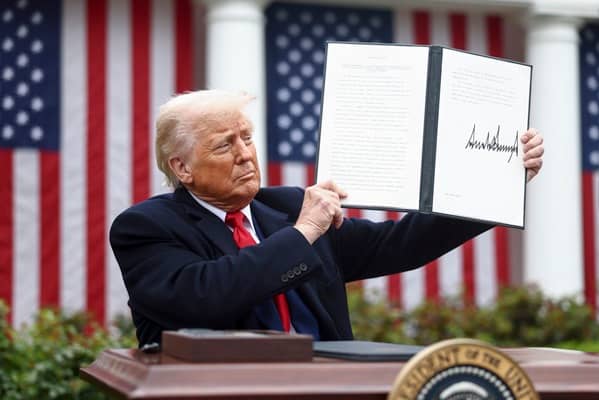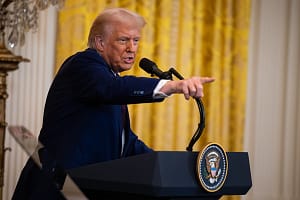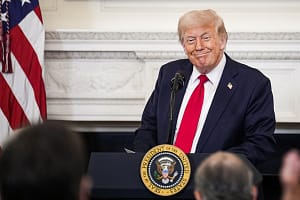President Donald Trump has announced that the U.S. will begin sending formal letters to foreign governments on Friday, July 4, outlining the specific tariff rates they will face on imports into the United States.
marks a significant shift from the administration’s earlier strategy of negotiating numerous individual trade deals.
The President pointed to the complexity of negotiating with more than 170 countries and said the U.S. will instead favour a simple, reciprocal tariff structure.
Letters will be sent in batches of ten countries at a time, with many expected to receive tariff rates between 20 per cent and 30 per cent.
The move follows Trump’s dramatic announcement on April 2, when he stunned markets by unveiling sweeping reciprocal tariffs ranging from 10 per cent to 50 per cent.
He later temporarily capped tariffs at 10% for most countries, giving time for negotiations through July 9.
Despite that grace period, many of the countries initially given a 10 per cent rate have not engaged in any formal trade talks with the Trump administration. One exception is Britain, which reached a deal in May to retain the 10 per cent rate and secured preferential terms for key sectors, including automotive and aircraft engines.
Mark McCarthy, Chief Revenue Officer at Basware, commented: “Trade wars and tariff uncertainty introduce volatility into the global economy. For major enterprises, especially those with complex supply chains or international footprints, this creates hesitation around IT spending. CIOs and CFOs may want to delay large IT investments, reassess strategic priorities and scrutinize every dollar of spend.
Despite economic uncertainty, companies are strategically prioritizing investment in mission-critical financial operations that offer minimal implementation risk while delivering measurable, rapid returns. Accounts Payable automation is essential for maintaining healthy supplier relationships during turbulent times when suppliers may be more sensitive to payment timing. Research shows up to 90% of businesses pay suppliers late, but automated solutions can reduce invoice processing from an average of 10 days to under four, ensuring timely payments to suppliers who may be facing their own cash flow challenges due to wider economic pressures.
Major trading partners currently in talks with the U.S. have faced much steeper tariffs, 20 per cent for the European Union, 26 per cent for India, and 24 per cent for Japan. Countries that have not entered negotiations are seeing even harsher penalties, such as 50 per cent or Lesotho, 47 per cent for Madagascar, and 36 per cent for Thailand.
Michael Joseph, Compliance Expert at Napier AI, commented: “Tariffs create a breeding ground for financial crime. Fluctuating tariffs, while designed to serve economic and national security objectives, have created unintended consequences. As supply chains reorganise in response, new vulnerabilities for money laundering and other financial crimes have emerged. Our research shows that money laundering and terrorist financing cost the US economy over $600 billion per year on average.”
“Tariff differentials between countries create strong incentives for trade diversion and misrepresentation. When goods face a 10% tariff from one country but potentially up to 145% from another, criminal organisations can exploit these differences through invoice manipulation, falsifying country of origin documentation, or routing shipments through third countries to conceal their true origin. These techniques are hallmarks of trade-based money laundering but can become more difficult to detect during periods of extreme volatility.”
On Wednesday, Trump confirmed a new trade agreement with Vietnam, cutting U.S. tariffs on Vietnamese goods from 46 per cent to 20 per cent, while granting duty-free access for a wide range of American exports.
Get real time update about this post category directly on your device, subscribe now.






Leave a Comment